This year’s annual Sussex Centre for Cultural Studies urgently explored the growing traces of fascism that have been emerging across the world in recent years. Dr Angela Neale started the day with a thought-provoking keynote considering how online spaces, such as 4-Chan, originally designed to enable democratic participation have become grounds for the development of alt-right groups and conversations. Her paper explored the complex relationship between the liberal intentions with which such spaces were created and the alt-right individuals who now consume them. She suggested that whilst the outcomes both groups desire might be radically different, they share similar perspectives regarding the current state of political affairs. Neale’s paper raises difficult questions for those who might consider themselves politically liberal and implies that to critique fascism, we might also need to introspectively turn to a re-evaluation of left-wing ideals too.
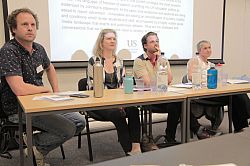

Throughout the day’s panel discussions, thoughts were directed to the ways in which cultural texts, such as music (Benjamin Bland), poetry (Savannah Sevenzo), television (Anna Graefer and Milena Popova), the digital (Hannah Lammin) or popular film (Wendy Timmons and Popova) might enable us to learn lessons about the past or help promote authoritarian or fascist ideals. Much of the concern, here, was that popular texts might encourage spectators to buy into authoritarian values without explicitly seeming to be fascist texts.
Another important strand across panels was the exploration of the ways in which fascism is embedded in contemporary politics and society. Professor Jason Lee questioned the extent to which Neo-Nazism, traditionally against internationalism, might be more transnational than it at first seems, exploring the similarities of different global movements. Whilst Dr Aristotelis Nikolaidis from Goldsmiths considered the way the neoliberal crisis in Greece inspired the rise of the Nazi party Golden Dawn and Georgios Karakasis examined the potential legitimisation of far-right groups given their support for the Assad regime in Syria. Turning his attention to authoritarian populism and popular authoritarianism, Dr Malcolm James explored how these tendencies are rooted in popular, everyday British culture today through London’s Olympic Development, questioning whether it is only those organisations that clearly advertise themselves as far-right that should concern those of us looking to critique the echoes of fascism in contemporary society.
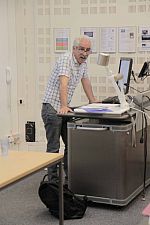
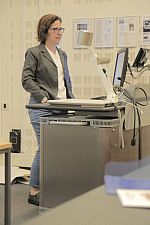
The two further key notes of the day by Dr Gholam Khiabany, and Professor Arlene Stein and Dr Sarah Tobia, both took a comparative approach to consider the relationship between historical and contemporary forms of fascism. Khiabany focused particularly on the ways economic crises have been, and are currently, blamed on migrant communities and the ways in which this serves to divide the majority and displace the blame of national financial issues. Stein and Tobias considered the relationship between historical anti-Semitism, particularly during the Holocaust, and the Trump administration’s so-called ‘Muslim ban’ through the lens of the current American president’s Holocaust memorial day speech, which omitted any reference to Jews and was presented on the same day that the travel ban directed towards Muslim-majority countries was announced. Both of these key notes suggested we consider whether we can indeed learn lessons from history, and if we can what lessons we can learn, and how we can learn from them. Most importantly, perhaps, as educators, these papers encouraged us to think how we can teach others to think about the past and the present simultaneously.
The day wrapped up with an important round table led by Sussex academics Professor Kate O’Riordan, Dr Rachel O’Connell and Dr Samuel Solomon about the tension between freedom to speak and freedom of speech in the university. Each speaker presented their own concerns as researchers and teachers in today’s contradictory climate in which university executives emphasise the importance of freedom of speech, whilst Government-enforced initiatives, such as Prevent require staff to report anything that might be considered to promote extremism. The discussion that followed highlighted that staff are unclear about what might be considered extremism in today’s climate and whether particular prestigious but controversial academic writing might be taken off reading lists in fear of potential consequences for academics, particularly for the more vulnerable early career researchers and teachers.

Echoes of Fascism - Programme
FRIDAY MAY 26TH 2017, University of Sussex (School of Media, Film and Music)
Keynote speakers:
Dr Gholam Khiabany (academic and political journalist, author of Blogistan)
Angela Nagle (author of Ireland Under Austerity and Kill All Normies)
Professor Arlene Stein (author of Reluctant Witnesses, The Stranger Next Door, Sex and Sensibility)
Dr Sarah Tobias (feminist theorist and activist, author of Trans Studies)
 Whiteness, Race and the Seaside
Whiteness, Race and the Seaside Friday 9 November 2018, 9.00-5.30 followed by Reception
Friday 9 November 2018, 9.00-5.30 followed by Reception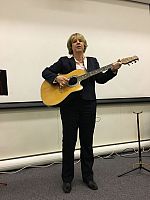
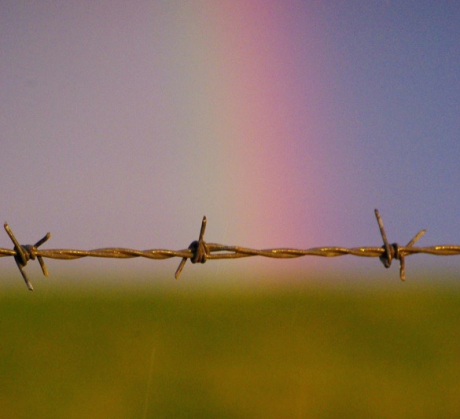
 10 February 2017 – Gendered Orientalism?: Counter Terrorism and the Gendering Anti-Muslim racism - USS Stratford.
10 February 2017 – Gendered Orientalism?: Counter Terrorism and the Gendering Anti-Muslim racism - USS Stratford. Friday 2
Friday 2 British Consortium of Comics Scholars Event:
British Consortium of Comics Scholars Event: Friday, February 5, 2016 from 6:00pm to 8:00pm
Friday, February 5, 2016 from 6:00pm to 8:00pm Co-organised by UEL School of Social Sciences and Sussex Centre for Cultural Studies
Co-organised by UEL School of Social Sciences and Sussex Centre for Cultural Studies Tuesday, 2
Tuesday, 2 British Consortium of Comics Scholars Day and Tea Party
British Consortium of Comics Scholars Day and Tea Party  Luce Irigaray is a French feminist philosopher who is known internationally for her work on sexual difference. This lecture was an opportunity to see a world-class intellectual speaking in English on a subject that is key to thinking about representation and culture, gender and politics.
Luce Irigaray is a French feminist philosopher who is known internationally for her work on sexual difference. This lecture was an opportunity to see a world-class intellectual speaking in English on a subject that is key to thinking about representation and culture, gender and politics.






















 We’re delighted to announce that on Tuesday 13 May 2014 at the University of Sussex, NGender will host its first annual conference.
We’re delighted to announce that on Tuesday 13 May 2014 at the University of Sussex, NGender will host its first annual conference. This SCCS event took place in the afternoon of on Thursday 8 May 2014, and included a screening of John Akomfrah’s film: THE STUART HALL PROJECT followed by a panel discussion of Stuart Hall’s work and legacy with AVTAR BRAH, DAVID MORLEY and NIRMAL PUWAR.
This SCCS event took place in the afternoon of on Thursday 8 May 2014, and included a screening of John Akomfrah’s film: THE STUART HALL PROJECT followed by a panel discussion of Stuart Hall’s work and legacy with AVTAR BRAH, DAVID MORLEY and NIRMAL PUWAR.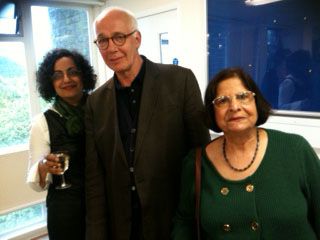
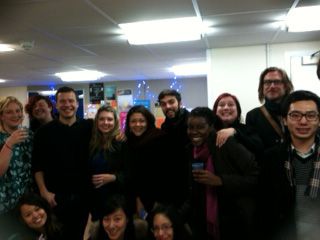
 Max performs his magical flying table trick at the Staging Illusion conference party, assisted by Sally Munt.
Max performs his magical flying table trick at the Staging Illusion conference party, assisted by Sally Munt. The Centre's third conference, on the first really hot Summer's day, explored the cultural context and functions of the paranormal and the supernatural in popular culture, literature and visual culture and in everyday life. The recent increase in popularity of all things paranormal across literature, art and popular culture suggests not only a reinvigorated interest in notions of the paranormal but possibly also new functions and pleasures of these fascinations and pursuits that this conference sought to engage with.
The Centre's third conference, on the first really hot Summer's day, explored the cultural context and functions of the paranormal and the supernatural in popular culture, literature and visual culture and in everyday life. The recent increase in popularity of all things paranormal across literature, art and popular culture suggests not only a reinvigorated interest in notions of the paranormal but possibly also new functions and pleasures of these fascinations and pursuits that this conference sought to engage with. 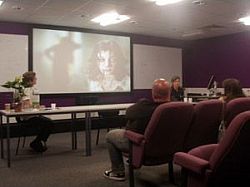
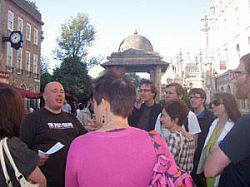
 In March 2009 the Centre co-hosted in conjunction with the Brighton and Sussex Sexualities Network [BSSN] a one-day conference on 'Queer Spiritualities' which brought together the eleven researchers that had been working on the 'Queer Spiritual Spaces' project over the year, with research participants from the case studies, as well as invited keynote speakers Prof Stephen Hunt (University of the West of England) and Dr Robert Vanderbeck (University of Leeds).
In March 2009 the Centre co-hosted in conjunction with the Brighton and Sussex Sexualities Network [BSSN] a one-day conference on 'Queer Spiritualities' which brought together the eleven researchers that had been working on the 'Queer Spiritual Spaces' project over the year, with research participants from the case studies, as well as invited keynote speakers Prof Stephen Hunt (University of the West of England) and Dr Robert Vanderbeck (University of Leeds).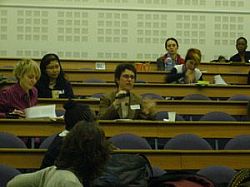
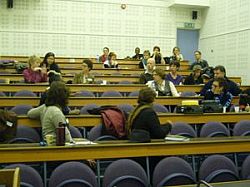



 Dr Anita Biressi and Prof Heather Nunn of Roehampton University
Dr Anita Biressi and Prof Heather Nunn of Roehampton University Prof Carolyn Steedman (Warwick) and Prof Jenny Taylor (Sussex)
Prof Carolyn Steedman (Warwick) and Prof Jenny Taylor (Sussex) The SCCS Seminar series has included the following talks:
The SCCS Seminar series has included the following talks: Gavan Titley, giving a seminar at the Sussex centre for Cultural Studies at the University of Sussex on 12 March 2009 on 'The Comforts of crisis: Recited Multiculturalism in Western Europe'.
Gavan Titley, giving a seminar at the Sussex centre for Cultural Studies at the University of Sussex on 12 March 2009 on 'The Comforts of crisis: Recited Multiculturalism in Western Europe'.